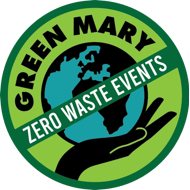Acceptable compostable wares in the SF Bay Area
All paper products are compostable nearly everywhere. In Sonoma County, visit that page under “Events” for those particulars. We like to say “compost anything that was once alive and it will be soil again within four months!”
All plastic utensils are TRASH, don’t buy “compostable,” you are just spending more money to make garbage. They are not breaking down…
The best utensils are made of birch or some other tree-based or paper.
Other compostable plastics MUST say “Compostable.” Green band around cups is GREAT, very recognizable!
All must be certified as compostable by BPI.
Green events rely on ALL food vendors’ participation
In accordance with state law, local mandates, increasing awareness and planetary dictate, events around the San Francisco Bay Area are focused on diverting waste from the landfill and preventing waste overall. Green Mary has been involved in researching and developing these systems since 2002.
Together, we focus on waste prevention and event greening by:
Knowing local requirements and opportunities
Communicating with all vendors to inform about the details at each event. We can take supplies orders and deliver.
Staying up to date on food service wares, compostable plastics, facility and venue operations
Rethinking practices and re-designing systems that work for everyone
Focusing on resource sharing among a vast network to support producers in keeping costs and waste down.
Bringing in re-usable wares and systems whenever possible
Here we list all the details that pertain to food vendors in the Bay Area, location by location and overall:
Styrofoam is completely banned at all Bay Area public events.
All San Francisco public events require composting as well as recycling as of October 29, 2009.
Unless you hear otherwise, our events all have full composting of all acceptable organic, biodegradable matter. (Sonoma County exception, see below)
We have full systems for food vendors and attendees to put food scraps and food-related service items in the appropriate containers, and sorting behind the scenes ensures maximum diversion.
We highlight the need to get our water locally, and offer water refill stations. Suggest food vendors look into other beverage options – bottled water is not healthy or wise.
Please educate yourself on the realities of plastics and packaging and the truth about plastics recycling.
Think waste reduction, including the reduction of packaging, optional food service supplies such as straws and lids and how to pass on your food and beverages in the lightest fashion possible. For example, the best beverage options are bulk liquids dispensed from large containers into reusable, recyclable or compostable cups.
The biggest steady change happening over the past few years is the reliance on biodegradable plastics in place of petroleum-based cups, utensils, to-go containers and trash bags. We have to be very careful by location regarding what is accepted. The details by San Francisco Bay Area region follow, and here is the information on acceptable compostable plastics.
Accepted Compostable or Recyclable Food Service Ware in the San Francisco Bay Area
All bioplastic wares must be certified as compostable by BPI.
San Francisco, San Jose, East Bay, The Peninsula
In San Francisco and the East Bay, we can accept all bioplastics in the compost.
On the peninsula, there is no composting of bioplastics.
In San Jose, all bioplastics can go in the compost bins.
Best choices for food vendors
Many food vendors are now relying on reusable wares, investing in real bowls, silver ware, cups and plates and are thus creating much more sustainable systems that rely on reuse rather than recycling, composting or trashing.
Here we list the best choices in order:
Offer discounts to those who bring their own supplies – have wax paper on hand to place down on your customer’s plate or bowl to ensure no contact with that surface.
Reusables – bring enough for the day and take them away to wash in an industrial dishwasher that reaches temperatures of over 180 degrees to ensure sanitization.
Bagasse paper food service supplies – purchase and use these paper supplies that are made from sugar cane trimmings, and are completely tree-free. They are typically not coated with any waxy lining, but make sure before bringing them here, or it will all go to the landfill.
Recycled content paper products – More distributors are carrying 30-100% recycled content paper products, the higher RCP the better.
Purchase unbleached paper products
Tree-free or recycled content cups for all liquids, steer away from plastics whenever possible.
You decide between bioplastics and petroleum plastics for utensils, to-go containers and cups and we will understand that we’re all doing what we believe is best.
Sonoma County
In Sonoma County, we have a compost facility that no longer takes bioplastic materials – no plastics made of corn or potato, which can include cups, utensils, to-go containers, and biobags made of polylactic acid. There is a process being investigated and perfected that removes petroleum particles from the process, but as of Jan. 1, 2010, they are not up to the OMRI codes this facility adheres to. Nor can we put any paper products that are LINED with plastic, no shiny coating anywhere, not “biodegradable coating,” nor petroleum waxy coating. (see best choices below)
Bioplastics Update
The Sonoma County Recycling Guide lists bioplastics as “neither recyclable NOR compostable,” as they do not break all the way back down to life, but leave trace particles.
Bioplastic wares are often not clearly labeled and there is great inconsistency in the industry and an overall lack of communication between key players, from manufacturers to the standards settings and end composting facilities.
They are fossil-fuel intensive in the growing of the organic material and in the shipping of them as well.
They are shipped great distances, from field to manufacturer to distributor to end user, to be used for a very short time, a fork for perhaps five minutes.
It is also the case that when bioplastics go to a landfill rather than to a compost facility, they generate MORE greenhouse gases than their petroleum-counterparts. In breaking down much more quickly, part of that breaking down is methane gas, so if the bioplastics do not go to a formal compost facility, they may contribute more to climate change in the immediate than their conventional alternatives.
The corn could have been used as feed stock rather than as a fork, and much of it is now genetically modified. We share this so you can make your best decision, fully informed.
It is up to each food provider to make the best choices, but being aware of some of these factors might help.
Re-usable wares are still the best choice. Let’s move event food systems in that direction together!

